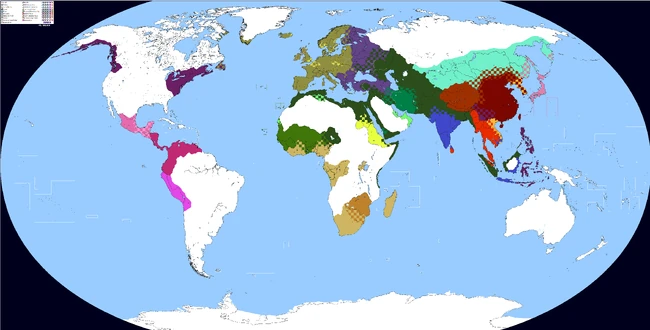A religion is a belief system that typically comes with rituals, spiritual beliefs and practices. Religion is a very important socio-political force in the year 1295, and has a vital impact on the spread and development of individual cultures and societies. The most widespread religions tend to be Christianity, Islam, and Buddhism, while many traditional indegenous religions also exist such as Shintoism, Hinduism, African and Chinese Traditionalism.
Map[]
| 1475 A.D. | |||||||||||||||
|---|---|---|---|---|---|---|---|---|---|---|---|---|---|---|---|
| Catholicism | Sunni | Hinduism | Fetishist | Judaism | |||||||||||
| Hussites/Lollards | Shia | Vajrayana | Faraism | ||||||||||||
| Celtic Lollard | Yuniyya | Mahayana | Animist | ||||||||||||
| Orthodoxy | Ibadi/Other | Theraveda | Mayan | ||||||||||||
| Coptic | Chinese Folk | Teōmaticolli | |||||||||||||
| Shinbutsu-shūgō | Inti | ||||||||||||||
| Totemist | |||||||||||||||
| Tengri | |||||||||||||||
Abrahamic Religions[]
Abrahamic religions are religions that trace their origin to the patriarch Abraham (fl. 2000 BC). The largest Abrahamic religions are Christianity, Islam, and Judaism. Abrahamic faiths all have very strict monotheism, and typically have beliefs of iconoclasm and special revelation.
Christianity[]
Catholicism[]
Player nations: Papacy, Venice, Milan, Hispania, Rhomania, Poland, Lubeck, Livonia, Lothraingia, France, England, Avalon, Ireland, Scotland, Wales, Örebro union, Iceland, Swiss Confederacy, Arles, Saxony, Burgundy, Auvergne
Celtic Lollardism[]
Player nations: Avalon, Ireland, Scotland, Wales, Örebro union, Iceland
Eastern Orthodoxy[]
Player nations: Novgorod, Wallachia, Byzantium
Oriental Orthodoxy[]
Player nations: Ethiopia, Georgia
Nestorianism[]
Jungism[]
Islam[]
Sunni[]
Player nations: Mali, Abbasids, Delhi
Shia[]
Other Sects[]
Judaism[]
Organized Traditional Religions[]
Hinduism[]
Player nations: Delhi, Majapahit, Tondo
Chinese Traditional[]
Player nations: China
Buddhism[]
Player nations: Dai Viet, Ayutthaya
Shintoism[]
Player nations: Japan
African Traditional[]
Player nations: Mali, Oyo, Zimbabwe
Unorganized Traditional Religions[]
Tengri[]
Player nations: White Horde
Native American Animism[]
Player nations: Iceland, Vinland, Iroquios
Teōmaticolli[]
Player nations: Michoacan, Mayapan
Inti[]
Player nations: Chimu
European Paganism[]
Player nations: Vinland, Livonia, Poland

